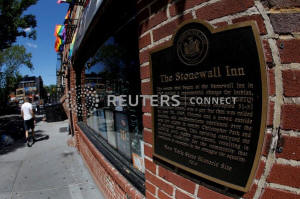|
Stonewall uprising veterans still
astounded 50 years after making history
 Send a link to a friend
Send a link to a friend
 [June 17, 2019]
By Daniel Trotta [June 17, 2019]
By Daniel Trotta
NEW YORK (Reuters) - Time has claimed many
of the street fighters who rebelled against the police raid of a New
York City gay bar 50 years ago, in what has become known as the
Stonewall uprising. Those who remain are still a little astounded at
what they did.
Standing outside the Greenwich Village tavern one recent morning, at
what is now the Stonewall National Monument, Mark Segal recalled the
spirit of 1969, when protests against the war in Vietnam coincided with
the African-American, Latino and women's rights movements.
Gay power was next.
"Standing across the street that night, that little 18-year-old boy who
is me, I never thought that I'd be here 50 years later talking about it.
We didn't know it was history. We just ... knew it had changed," said
Segal, now 68, who has been at the forefront of the LGBTQ rights
movement ever since.
On June 28, 1969, New York police raided the Stonewall Inn, ostensibly
to bust an illegal Mafia-owned establishment selling watered-down liquor
without a license. But police also abused the patrons as they had done
to gays many times before. Police also suspected the bar's management
was blackmailing wealthy customers by threatening to out them as gay.
The patrons of the Stonewall, including Segal, had had enough, and they
fought back.

https://tmsnrt.rs/2X5X2Q4
"When I stood here in the midst of it all, I remember saying to myself
in just an instant: OK, this is what I'm going to do for the rest of my
life," Segal said.
On June 6, just weeks before the city was expected to welcome 4 million
visitors to mark 50 years since the uprising, the New York Police
Department apologized https://www.reuters.com/article/us-usa-lgbt-stonewall-nypd/new-york-police-commissioner-apologizes-for-stonewall-raid-in-1969-idUSKCN1T72IR
for the first time for the raid.
New York has been designated the site of World Pride this year and
parades around the globe are set for June 30.
UNRULY CROWD
It all started with those who were kicked out of the bar and onto
Christopher Street that night. They gathered near the door, soon to be
joined by an unruly crowd.
Protesters started throwing coins, then beer cans and bottles, according
to David Carter's meticulous retelling in the 2004 book "Stonewall: The
Riots that Sparked the Gay Revolution." At some point a lobbed
cobblestone landed on a patrol car, prompting the police to barricade
themselves inside.
The crowd grew larger, and more restless, hurling bricks, fuel-filled
bottles and garbage cans. Some people tried to light the place on fire,
while others battered the plywood window with a parking meter.
Meanwhile, the cops inside feared for their lives, pistols at the ready,
according to Carter's account, but Deputy Inspector Seymour Pine ordered
them to hold fire unless he shot first.
[to top of second column]
|

A man walks past the Stonewall Inn, site of the1969 Stonewall
uprising, considered the birth of the lesbian, gay, bisexual and
transgender (LGBT) movement in Greenwich Village in New York City,
June 4, 2019. REUTERS/Mike Segar/File Photo

The police were shocked, Carter writes, not just by how rapidly the
crowd had grown, but that normally acquiescent homosexuals were out
in force, shouting "Gay power!"
"It's like Rosa Parks when she wouldn't give up her seat on the bus.
You can only push people around for so long," said Randy Wicker, 81,
who was active in gay rights even before Stonewall. "And once they
get a certain sense of self-respect, they say I'm tired of being
treated this way, they resist."
Eventually, the fire department and police riot squad known as the
Tactical Patrol Force (TPF) arrived, breaking up the crowd. But
there was more rioting and street battles with the TPF the next
night, and an atmosphere of more subdued tension lingered in
Greenwich Village for a few more days before one final night of
outrage.
Suddenly, lesbian, gay, bisexual, transgender and other queer people
were motivated and organized.
At the time being gay was virtually illegal and anti-discrimination
laws nonexistent, but Greenwich Village was relatively free
territory for all: butch lesbians, drag queens, street queens,
transgender women of color and of course gay men. The Stonewall Inn
welcomed everybody.
"We had lesbians, fag hags, African-Americans. Most of the drag
queens were Spanish. It was a very mixed," said a man who goes only
by the name Tree. He recalls dancing in the bar the night of the
raid and is now a bartender at the inn.
"But we wouldn't drink the liquor because we heard what they did to
it to fill up the bottles."
Among the groups born out of Stonewall was the Gay Liberation Front,
which made a statement simply by putting the word gay in its name,
said John Knoebel, one of its early activists. Homosexual was in
more common usage, and pro-gay advocates were called homophiles.
"'Gay' as a word was a new, dynamic radical word to use," Knoebel
said. "We were the first organization that actually called ourselves
gay and that was an offensive word to many people. We were naming
ourselves and identifying ourselves and finally out of the closet
and open and radical."
(Reporting by Daniel Trotta in New York; Additional reporting by Dan
Fastenberg; Editing by Frank McGurty and Grant McCool)
[© 2019 Thomson Reuters. All rights
reserved.]
Copyright 2019 Reuters. All rights reserved. This material may not be published,
broadcast, rewritten or redistributed.
Thompson Reuters is solely responsible for this content.
 |